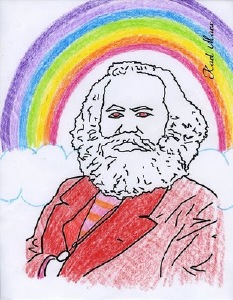Marxist theory
David Harvey addresses #OccupyLSX: The best system money can buy
November 12, 2011 – Professor David Harvey addresses Occupy London Stock Exchange (#OccupyLSX)
Political crisis in Italy and Greece: Karl Marx on ‘technical governments’

By Marcello Musto
November 16, 2011 -- Links International Journal of Socialist Renewal -- In recent years Karl Marx has again been featuring in the world’s press because of his prescient insights into the cyclical and structural character of capitalist crises. Now there is another reason why he should be re-read in the light of Greece and Italy: the reappearance of the "technical government".
As a contributor to the New-York Tribune, one of the widest circulation dailies of his time, Marx observed the political and institutional developments that led to one of the first technical governments in history: the British cabinet of the Earl of Aberdeen, December 1852 to January 1855.
China: Marxism with capitalist characteristics?

[For more discussion on China's economic and political development, click HERE.]
Ian Parker reflects on a recent visit to China
November 9, 2011 -- Socialist Resistance -- Capitalism in China is rapidly uprooting and throwing into the marketplace all that seemed fixed and frozen since the revolution in 1949, but -- as with all other forms of capitalism -- this market is all but free. The bureaucracy holds in place systems of authority necessary for capital accumulation, and the Chinese state is a key player in the enrichment of a new bourgeoisie. There are particular political-economic and ideological conditions for this transition, of course, and one of the most important is the legacy of Maoism, and how the claim to be a socialist country is squared with the rapid abandonment of each and every tenet of socialism.
Is democracy the enemy? A reply to Slavoj Zizek

Slavoj Zizek addresses Occupy Wall Street.
How socialists work to win mass support

By Dave Holmes

By Lee Sustar
John Bellamy Foster: The ecology of Marxian political economy

[This article is an extended version of a talk delivered at the Marxism 2011 Conference, University College of London, July 3, 2011.
Marxism and ecology (video): John Bellamy Foster at Marxism 2011
John Bellamy Foster addresses the British SWP's Marxism 2011, July 3, 2011.
For an extended text version of the talk delivered at the Marxism 2011 Conference, University College of London, July 3, 2011, click HERE. John Bellamy Foster will be a featured international guest at the second World at a Crossroads: Climate Change – Social Change Conference, Friday, September 30 – Monday, October 3, 2011, Melbourne University.
Keynote speech by John Bellamy Foster: "Capitalist crises, ecology and socialism"
Friday, September 30, 2011, 7.30-9.30 pm,
Sidney Myer Asia Centre (http://maps.unimelb.edu.au/parkville/building/158), Melbourne University.
